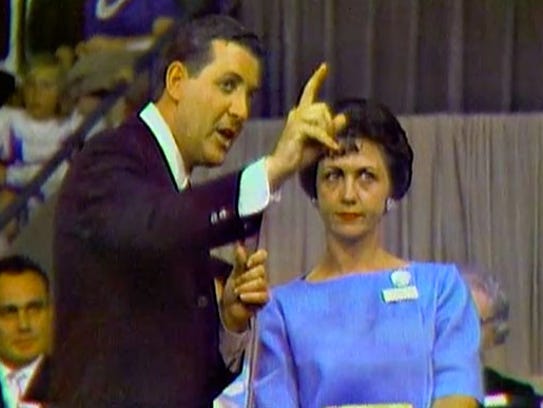For that we turn back the clock to 1990 when I was a young assistant professor at Chicago, more than a decade before this blog started, even before the world-wide web. The Chicago Tribune was a pretty good newspaper in those days before Craigslist. Nevertheless, the Sunday Tribune, as well as many other papers across the country, included Parade, a pretty fluffy magazine. Parade had (and still has) a column "Ask Marilyn" written by Marilyn vos Savant, who does not hide the fact that she had the world's highest IQ according the record books in the 1980's.
In 1990, vos Savant answered the following question in her column. Think about the answer if you haven't seen it before.
Suppose you're on a game show, and you're given the choice of three doors: Behind one door is a car; behind the others, goats. You pick a door, say No. 1, and the host, who knows what's behind the doors, opens another door, say No. 3, which has a goat. He then says to you, "Do you want to pick door No. 2?" Is it to your advantage to switch your choice?This is the kind of deal Monty Hall might have made on his show and so his name got attached to the problem in a 1976 paper in the American Statistician. Marilyn vos Savant claimed it was an advantage to switch. Many mathematicians at the time wrote into Parade arguing this was wrong--either way you have a 50% chance of winning. Even several of my fellow colleagues initially believed it made no difference to switch. Who was this low-brow magazine columnist to say otherwise? In fact, Marilyn was right.
Here is my simple explanation: If you make the commitment to switch, you will win if you pick a goat in the first round, a 2/3 chance of happening. Thinking it makes no difference is a fallacy in conditional probability, not unlike Mossel's Dice Paradox.
Monty Hall himself ran an experiment in his home in 1991 to verify that Marilyn was correct, though modulo the assumption that the host would always offer to make the switch and that everything was chosen uniformly.
Thanks to Bill Gasarch and Evan Golub for some useful details and links. Bill says "history being history, Monty Hall will be remembered as a great mathematician working in Probability." Maybe not, but it does get him remembered in the computational complexity blog.

Do you have any evidence that "many mathematicians" wrote to Marilyn and told her that she was wrong? I have her columns. They don't give a detailed breakdown by area of expertise of the author. She says one letter telling her she is wrong is from a statistician at NIH. She quotes several letters from people with Ph.D.s and says that 65% of letters from universities disagree with her. The handful of mathematicians I discussed the problem with at the time all gave the correct answer.
ReplyDeleteThe NYT column mentions three maths professors writing to her claiming she was wrong, and arguably three is many :-)
ReplyDeleteI recall reading a biography of Erdos which mentioned that when he saw the Monty Hall problem he also though Marilyn was wrong and it took quite a while to convince him otherwise.
ReplyDeleteI find that very hard to believe.
DeleteAt the time I thought of a slight variant of the question that has a different answer. Suppose Monty Hall did not know in which door the car is, and he opens one of the other two doors randomly. Conditioned on seeing a goat, should you switch?
ReplyDeleteThe answer is that now the chances are 50-50.
It really surprised me that in order to estimate the chances, the knowledge of the gameshow host should be taken into account.